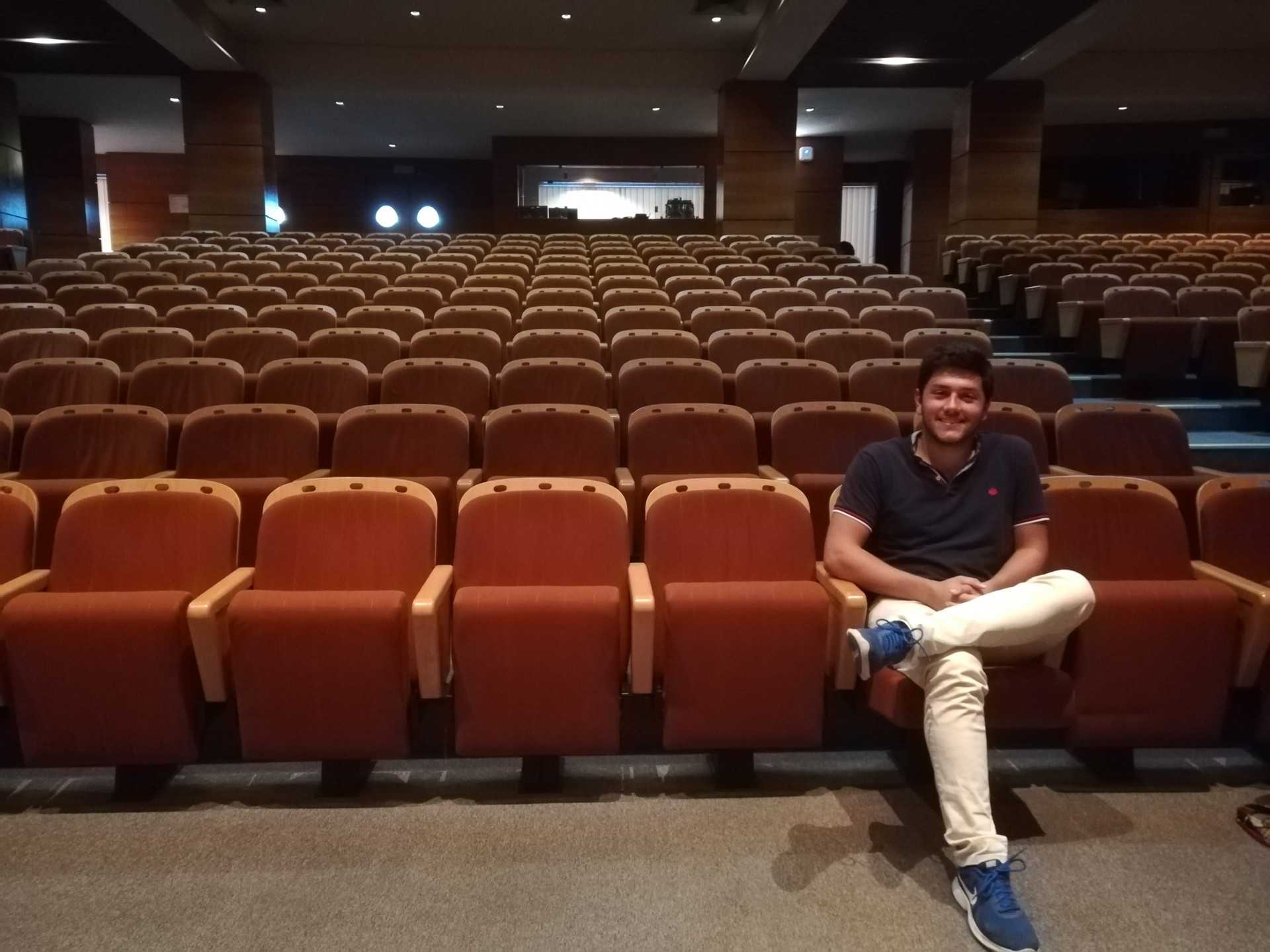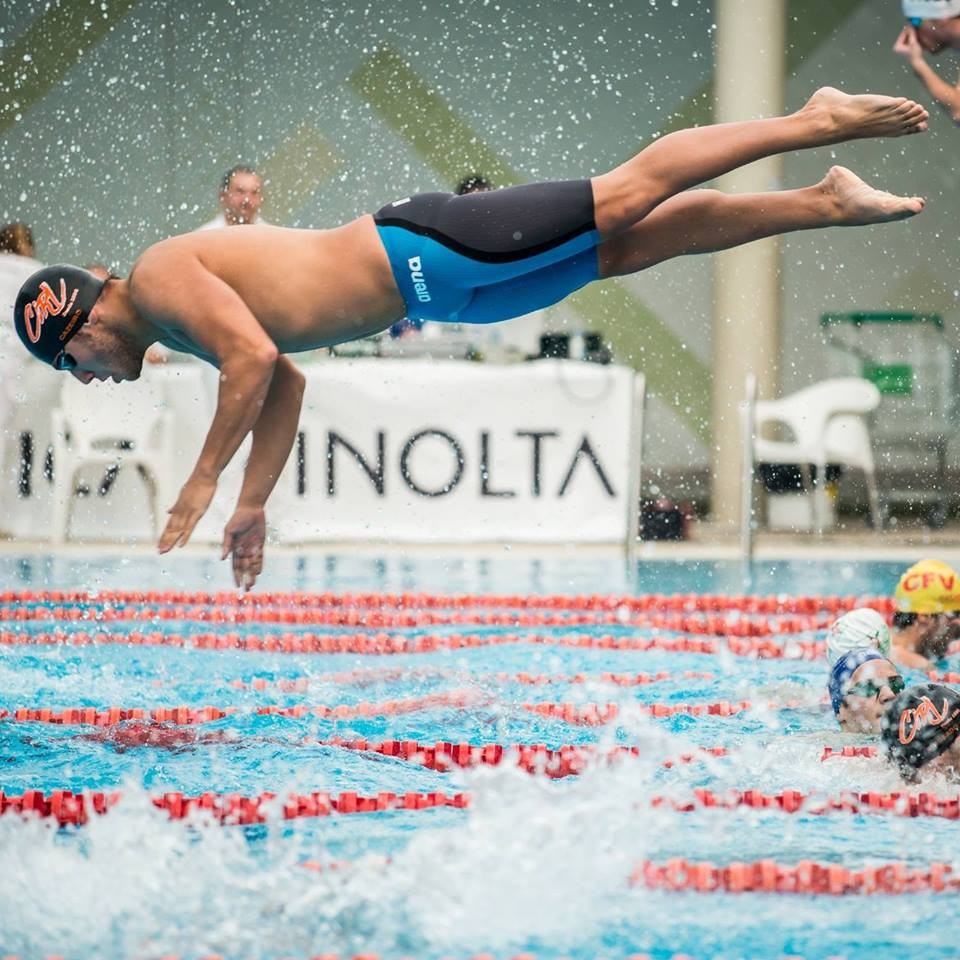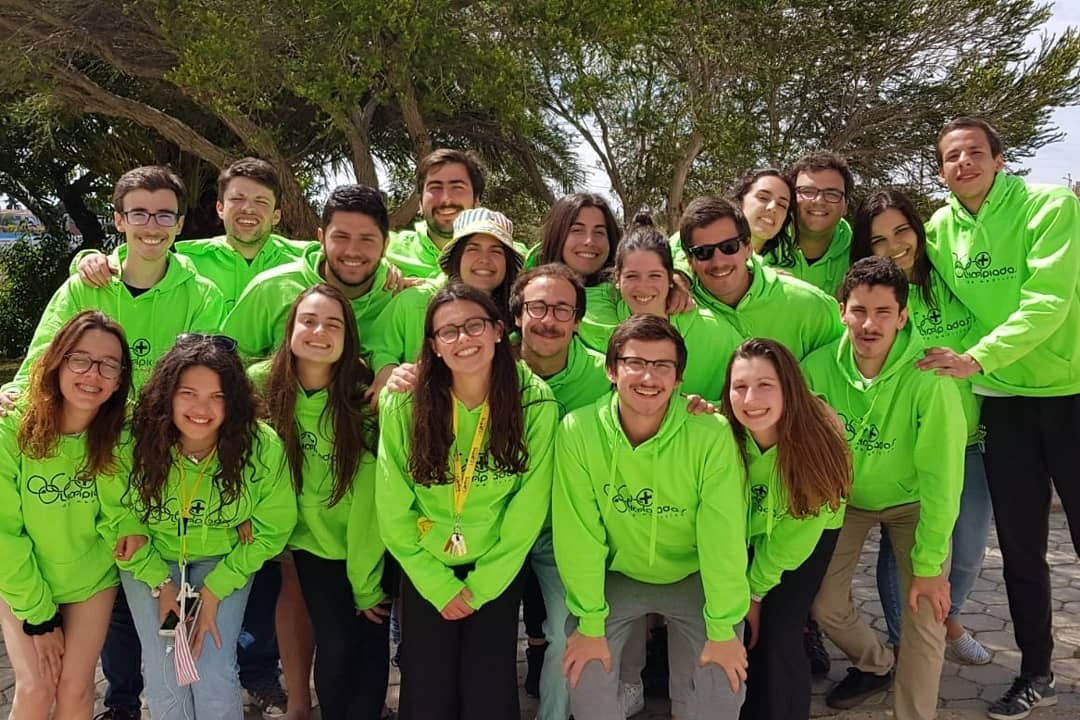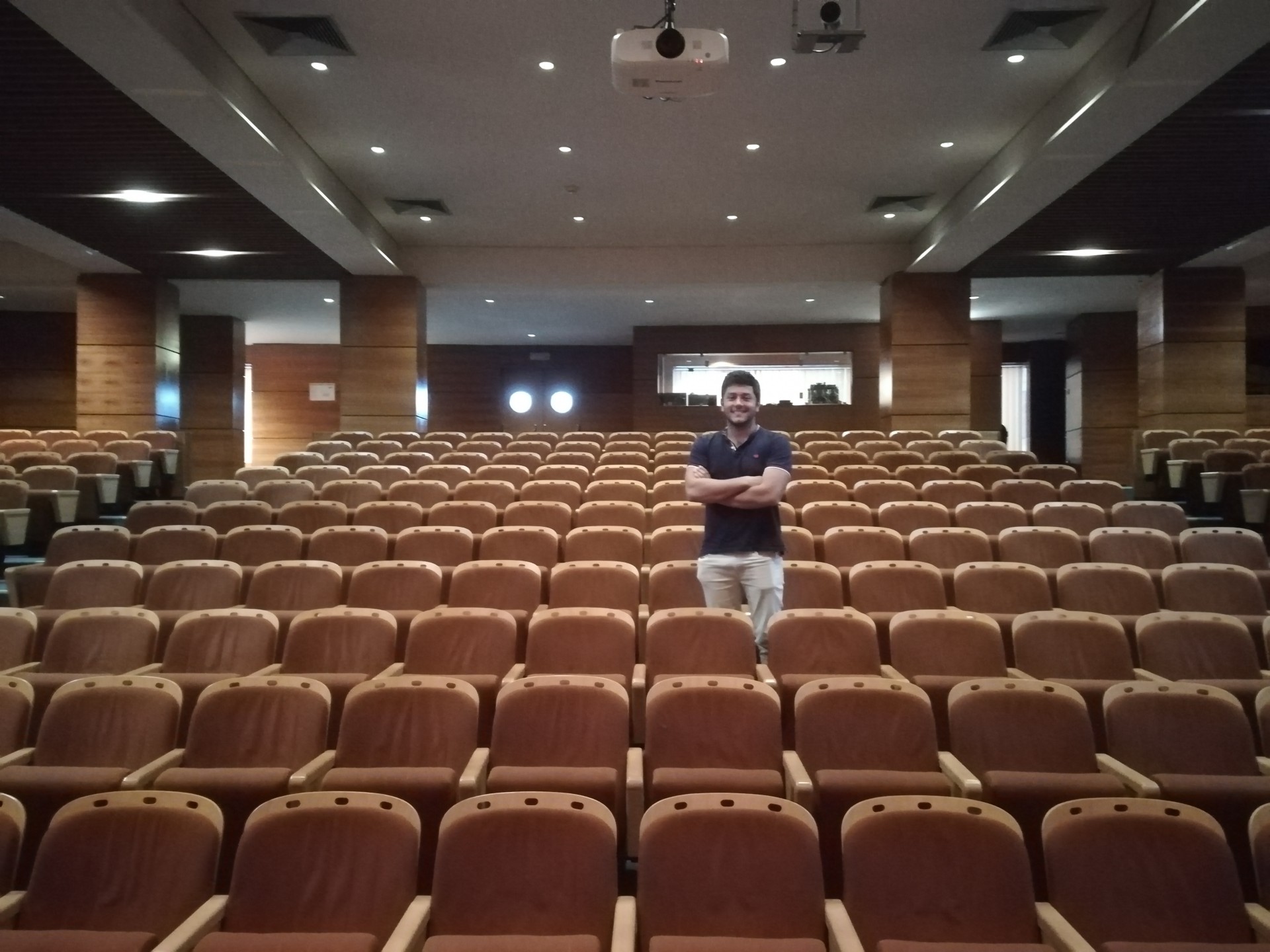
I asked him if he had a favourite place for us to meet. With no preference for a specific room, he just said that his favourite building is the Egas Moniz, where he spent most of his time studying, but especially because it was where he submitted his candidacy for the general coordination of the 2019 Medical Evening.
I booked the João Lobo Antunes Grand Auditorium and that is where we talked, and the idea did not come by chance.
Both uncomfortable in the chairs next to each other, and until we started talking about the reserved boy who was barely moving, I came across someone much more relaxed who stretched his legs down the aisle and rested his arms on the side chairs.
He does not make a fuss easily, at least with those who he does not know and he does not say anything without thinking carefully before. Those who know him well laugh out loud, especially when he imitates people they know, such as the lecturers, or when he makes fun of himself.
I move to another chair on the side, keeping a reasonable distance to allow me to look at him better. And the room that looked like an empty, cold echo began to take shape, to come alive.
We can start by introducing him by saying that although he is 22, he has spent most of his life swimming. He started at 3 years of age and at 8 he started to compete, becoming federated at 9. He interrupted swimming just last year. We also interrupt swimming here, to resume it later. A precocious young man, Daniel Cazeiro should be in year 5 of medical school, but he is in year 6.
He speaks proudly of the private school where he studied until the 9th grade in Seixal. Then he went to a state school. It was there that he met the teacher who chose him to participate in Jorge Gabriel's RTP entertainment programme entitled - "Sabe Mais do que um Miúdo de 10 Anos?"(Do You Know More Than a 10-Year-Old?) as one of the top-rated children in the country. He lives in Fernão Ferro and has always lived there. Coming to Lisbon when he was a boy was an extraordinary event, either to swim or to enter those “huge buildings” like the Sheraton Hotel, when he did the castings for the programme. After questionnaires and interviews, going through different phases, Daniel was among the chosen ones. The goal was that, in the face of a set of questions from 1st to 6th grade subjects, an adult managed to know all the answers; when this was not the case, they asked the kids for help. When they didn't get it right, they had to accept that "they didn't know more than them who were ten years old". It was easily concluded that “kid” Daniel knew more than most adults.
As for swimming, he interrupted it in 2018, when he joined the Directorate of Sports and Wellness of the Student Association in year 5. An old love, swimming was stopped just for a while, because Daniel knows that he will probably return to it very soon, as he finds it "boring just to study".
But looking at his academic background of the last few years of life, one cannot really say that life has been boring at all. A junior assistant in Anatomy in years 2 and 3 and in Neuro-anatomy in year 3, one year later he became involved in Solvin'it and its root organization. Getting involved in projects was a prerequisite for absorbing the amount of responsibility he needed to feel complete. As if all of what he had accumulated to date was not enough,
he still found time for another passion, basketball, an activity that made him part of the AEFML team. He didn't have this opportunity but he regrets not knowing music professionally; Still, it is a self-taught guitar player.
He speaks with almost adolescent enthusiasm about the cultural diversity of his own Faculty, and is still fascinated today when he attends the Cultural Performance or listens to the Choir or the Medical Orchestra.
He talks about his mother a few times, who is his pillar, a guiding reference who made him see that you don't always get everything you want. And Daniel thanks her for realizing that.
At this moment, as an intern in General and Family Medicine, 100 meters from his home, he still prefers a quick visit to Lisbon, so as not to miss any moment of friendship that in a semi-silence he fears he may miss. Year 6 of the degree will make him spend more time in internships at the South Bank hospitals, but he does not forget where this joy that feeds him every day like in car's fuel. Being happy is, for him, the greatest cause of all in life.
"But let's get down to business" “Mas vamos ao que interessa”, because I wanted to meet Daniel since he is the general coordinator of the Medical Evening. And, instead of knowing about the event only after it happened, we spoke before, gaining a new perspective on what happens when you only see something on stage for the first time.

The funny thing with you is, whereas most of the students who make up AEFML start in their initial school years and then grow up hierarchically, this did not happen to you, as you went straight into coordination just in your year 5. Why is that?
Daniel: Maybe I changed my life priorities. Swimming, in my high school years, was my focus because I was concerned with getting results. I realize that I was never much involved in project organization, which is one of the aims of the Association. And I admit that I was amazed when I received a call from Andreia Daniel (former AEFML President) inviting me to take over the Sports and Wellness coordination. So, I accepted without hesitating, I was happy to be in the organization of some activities, but also because I knew that great relationships develop with many people.
You are very supportive of the group, with a strong sense of unity, I have been told. Is that so?
Daniel: Yes. Maybe that even explains why I enjoy group sports a lot more than individual sports.
But isn't swimming an individual sport, even lonely?
Daniel: Well... it's mostly an individual sport, it's just our performance that dictates the results and dictates them very objectively. If I am training very well and I feel very good, then I will reach that time. And if I did that time, then I was good. But also, when we practice a lot and feel very tired, or can't even practice as much as we wanted, then time reflects our behaviour as well. In team sports (and there is also a team in swimming), it is the balance among all that dictates their results. The group gives us another motivation, even in practice.
I believe that despite this notion of commitment versus final results, you may already have experienced the situation when you have worked hard and when you see the final result, which is immediately disclosed, you realize that this result was not good. What do you feel about this confrontation with yourself?
Daniel: It turns out to be expectations’ management and it depends on the season we are in. That is, throughout the swimming sport season, there are many times when we go to less important events and we know that not doing our best time is not so bad, it can be positive because it shows us that we are not fully fit. It is the coaches who strategically plan our seasons so that we are at our best. In my case, it coincided with the national championships. I have never been good enough to reach international goals.

Was it never the question of losing that made you give up swimming?
Daniel: There was a stage in high school where my stagnation during the exams’ period was a factor of great demotivation in my life. I had a phase when I was almost reaching the national podium and didn’t get it… for a year, my times stagnated completely. Then I really wanted to give up. (looks around the room as if analysing himself). My mother never let me demoralize, she always said it would get better. And being back with friends and training together made me overcome my demotivation. But national results have never been the best of the best. Now, of course there is frustration, because sometimes the result does not reflect the effort invested. Still, I can say that in swimming, work really pays off.
Is this then a clever way to train yourself to deal with the losses, defeats, and confrontations that arise throughout your life?
Daniel: No doubt! But what helped me the most was time management, not expectations’ management. My mother taught me this very well, always prioritizing the most important. So I didn't learn so much from sporting losses, because I always placed learning on top and knowing how to manage it was the great learning. I would say that is the fundamental soft skill for any medical student. And the sooner we learn to do several things at once, the more we have to gain.
And now "Let's get down to business," which is precisely the motto of this year's Medical Evening.
Daniel: "Let's get down to business" is the first sentence of the first song our year made.
You wrote something publicly and I quote: "In 2014, a 17-year-old boy entered the Faculty of Medicine of the University of Lisbon. For the first time in November, he watched the best show ever organized by a group of university dreamers - Medical Evening.... That same night, a friend of this boy looked at him and said, "Someday we will be there". And today here you are coordinating it.
Daniel: When this friend of mine told me that, he really touched me. When we enter university and are freshmen we fall in love with everything, it's all new and it's all fantastic! I love my Faculty; I wouldn't trade it for anything in the world! I longed to reach year 6 with the notion that time flew by. I knew I was going to have to study hard, but I knew that one day we would be there. I knew I had to take part in a show with the dimension of Medical Evening. By the time you reach year 6 most of the class will be involved in this show. And now I feel that our moment is coming.
But before that there is another moment when you propose to take on the general coordination. How did this happen?
Daniel: In mid-February, when we finish the exam season, it is when the nominations for the ME organizing committee occur. I had never thought of a specific position. I just knew I wanted to be there actively. Two weeks before the nominations, talking to a friend, she challenged me to think about applying for general coordination, as I was used to managing large teams. I kept thinking about that. Then I spoke to the general coordinators and listened to their experience, and in fact, until the last moment I was unsure if I should apply. The transacting organizing committee came and we discussed and voted on the structure of our own committee: how many departments it will have, how many people in each, and what structure it should follow. But when the question of who would take over the overall coordination was posed, I got up from the chair, I offered myself. Being the only one applied, we had a vote by acclamation.
It's October, is everything practically done?
Daniel: Yes... more or less....
But is there a guideline, right?
Daniel: Yes, but it implies explaining the whole organizing committee. It has the following departments: the General Coordination (divided into two elements); the Treasurers; the artistic departments - Artistic Direction (responsible for choosing the theme and bringing together the script's working group, the castings, rehearsals and the link to the companies that will be working in Campo Pequeno); Dance (the name says it all); Scenography (responsible for the construction of sets, props and costumes) and Production, Image and Dissemination (which makes the image of the entire project, filming, etc.). Then we have sponsorships, which are responsible for raising logistical and financial sponsorships, and finally (but not “last”) we have Logistics, which conducts fundraising initiatives throughout the year. I have said in recent days that I am the "hole plugger" because I always try to keep up with all the best I can. Of course, the artistic departments are under pressure and have a lot of work at this stage (closer to the show). It's hard but it will pay off!
And are the invitations to the lecturers to participate in some parts well accepted?
Daniel: (He smiles, often he says only half of what he thinks) Yes, it's up to CONM to consider who to invite and include. This year we still don't know if we will have the presence of the lecturers. (He smiles again) I won't say who or if we invited any, either. (New smile)
Your hit was recorded last weekend (almost early October). Did it go well?
Daniel: Yes, it was recorded, we only have the footage. Now the editing will be done then we'll see the final result. But I am very confident because I think it will be very different from what the last Evenings did.
Can Medical Evening also be your "revenge " when you reach year 6 and have some messages to pass on? Or is it unfair to make this interpretation?
Daniel: (He listens, looking very interested and serious) Medical Evening is an almost centenary academic performance. The first edition was performed in Politeama. And of course, in some moments of oppression, one took the opportunity to say what one thought. I think the fact that we have the opportunity to be onstage and portray the life of a student in this Faculty eventually gives us that opportunity to say what we want, but with some quotes. That's why we use sarcasm and irony to make a satire. And if this satire always focuses more on the lecturers, I think we can say that they are already used to it. I think they already look at it positively and laugh at themselves.
Are you worried what the post event feedback there will be?
Daniel: Of course it worries me. I want everything to go well, but for that to happen there is a lot to be said. Organizing such an event does not always go well, there is always something that fails. We are under a lot of pressure and here I talk of the students. Of course, despite having been friends for years, there is always that "rivalry" of wanting to do even better. As you have seen our year in other Medical Evening participations, now they come to us saying that they have very high expectations. It worries me and all who make up the committee. We are afraid, we ask ourselves "will the students like it? And the lecturers, what will they say?". Another curious thing is to receive feedback from people who are distant from this environment and who appreciate and value us. Then we have our freshmen coming here already talking about Medical Evening as a reference.
What is the limit to humour?
Daniel: I think the limit... Well I mean, there are a lot of types of humour. There is, for example, dark humour and it seems that it always surpasses some limits. It is always very difficult to realize the limit for each person in that arena. We have already witnessed scenarios in ME where there is very direct criticism, and those moments mark. However, I think it never had a negative impact on the students afterwards. The limit... What is the limit? For me the limit of humour is when someone disrespects me, or insults me in an ungoverned manner. I think I will never know what the limit to humour is and I am sure there have been lecturers who were not very pleased with what they heard in ME. If on the one hand we have to be prepared to listen to humour, on the other we have to emphasize that this is a satire show, we even laugh at ourselves.

Let me take this last part. I am also told that where you are there are parties and jokes, you make everyone around you laugh. But there is another detail that I noticed, you laugh at yourself, you are quite capable of posting a picture of yourself and saying something like "now me in my fatter version". How important is it to be able to laugh at ourselves?
Daniel: (laughing very spontaneously for the first time). Yes! I do it all the time, of course! I can laugh at myself, yes. It is curious that anyone who knows me well now tells me that at first it was unpleasant. I was amazed when I heard that. Because I'm an extrovert, but only with whom I know well. I like to provide everyone with a good atmosphere, either because I'm just silly, or just because I'm fun and that's why I've always liked to joke and imitate others. I like to laugh a lot and laugh at myself. It is preferable to look at life like that.
Do you think you still know more than a 20, 30, 40-year-old person, like in the RTP programme when you were only 10?
Daniel: Hmm ... I don't know how I can answer because I fear how it will be interpreted. I am demanding with myself. I think that having knowledge, knowing more, or being educated does not translate into being a good student. As I progress through the degree and meet fantastic people, I think they have a huge level of knowledge! And it's not because I get good grades that it makes me smarter than the others. I know people who know a lot about medicine, but the exams they took didn't go so well, I know others who know about topics I don't know about, like politics, where I don't have the knowledge to argue, and they are like I will never be. I am someone who can achieve the goals I set myself, but I don't make it the only thing that matters in life.
Meanwhile, you have been awarded a few Merit Diplomas.
Daniel: Yes, so what? This does not mean that those 5 who receive the diplomas as the best students of that year are the ones who know the most. I have colleagues who knew much more than me, but getting good grades is not just about knowledge.

Daniel, this room (G. Auditorium) has nothing to do with Campo Pequeno (where the Medical Evening will take place), but inside it and when it is full and one is facing the audience, it seems that we become breathless. What are you going to feel before the show begins and at the end with the final applause?
Daniel: Undoubtedly, it is almost heart attack material! It is a lot happening at the same time and it may fail at first. Then there are public reactions that we can't control, it's anxiety. It will take my breath away... But my wish for 6 November is that when the curtains are drawn I will be jumping up and down with joy.
Are you afraid to fail?
Daniel: Of course I am. But I have 37 people who are with me, for good and for bad. If it goes well, it will be good for everyone, if it goes wrong it will be bad for everyone. We are all together and this is reassuring, but my biggest fear is not meeting expectations. Now, and seeing the script and all that has been recorded, for me this will be the best Medical Evening ever!
Joana Sousa
Editorial Team


